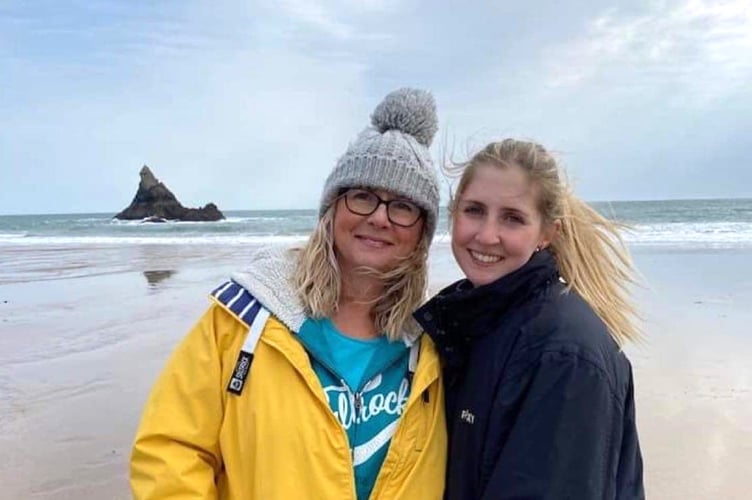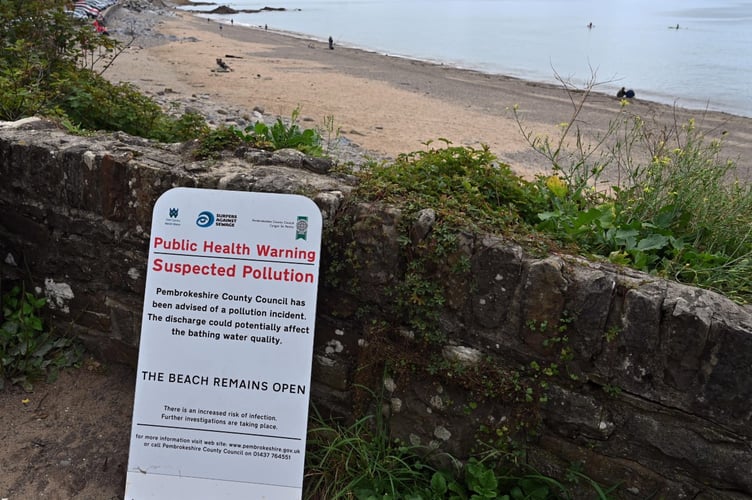A Pembrokeshire mother has offered a stark warning about the current state of water pollution across the county, after her daughter became seriously ill after swimming in the sea at a local beach.
With more and more alerts being raised by campaign groups such as Surfers Against Sewage highlighting untreated sewage being pumped into seas and rivers, water companies, politicians and local MPs are being challenged on what moves are being made to ensure this is overcome for the good of the environment and people’s health.
Pembrokeshire resident Jayne Etherington and her daughter twenty-two-year-old Caitlin Edwards joined the South Pembrokeshire Bluetits swimming group last summer with the intention of making the most of the beautiful beaches in their locality to undertake as much wild swimming as they could, with the wellbeing and health benefits it brings to so many.

“We made a pact to go sea swimming as often as we could together. The fact that she (Caitlin) ended up in hospital as a result of that still haunts me!” said Jayne, who soon discovered that her daughter Caitlin had in fact contracted an E.Coli bacterial infection after swimming in the sea in Amroth, as the result of a sewage discharge in that area.
After the swim one August morning, Caitlin underwent a month-long horrifying ordeal that saw her hospitalised after experiencing severe stomach cramps and diarrhoea.
She checked into A&E in London where she was told E.Coli had led to haemolytic uraemic syndrome, a rare condition damaging her kidneys. After a succession of blood transfusions and dialysis, Caitlin finally left hospital three weeks later.
“I had the phone call to say she was critically ill in hospital at the start of September last year. I have photos of Caitlin in hospital receiving a blood transfusion at the same time as having dialysis. They are too personal to put in the media - but the people responsible for polluting our seas and rivers, including Dŵr Cymru need to see them!” continued Jayne.

“The E.Coli caused a more serious condition called haemolytic uraemic syndrome (HUS) which is a life threatening condition, causing red blood cells to spilt and clot, resulting in kidney failure. It can be fatal.
“Fortunately, Caitlin survived and her kidney function is back to normal now, but she had to have several blood transfusions and over a month of dialysis before she turned the corner properly.
“After an investigation, Public Health Wales concluded that swimming in the sea after the sewage discharge was by far the most likely cause of her terrible illness. But the sewage keeps getting dumped. We never go in the sea now without checking the Surfers Against Sewage app.
“What needs to happen before MPs, the water companies and the councils actually start to make significant changes to current practices?” she remarked.
“When Caitlin was taken so ill, there was a known sewage discharge incident, but the beach wasn’t closed and the water wasn’t tested. I’m shocked about that.
“The Local Authority knew there was a serious sewage incident from a caravan park site and there were signs put up on Wiseman’s Bridge, but not on Amroth and not on Saundersfoot, the next beaches down.
“One of the things I’m trying to do is find other people who became ill from swimming in the same area that Caitlin swam in last summer.”
On the incident, a spokesperson for Welsh Water said: “The spill in August last year was not from a Dŵr Cymru Welsh Water asset but originated from a private sewerage system from a nearby caravan park, which was confirmed following a full investigation by Natural Resources Wales (NRW).
“Doing all that we can to improve river and coastal water quality is one of our primary responsibilities and we’ll continue to work together and play our part to protect it.”
A year after the incident, Jayne said that another sewage alert was highlighted for the same area this August, but this time no signage had been put up by the Local Authority.
“I drove to Wiseman’s Bridge, and whereas last year there were signs up warning people about pollution, this year, even after all the illness that’s been caused and the supposed heightened awareness, there were no signs up!” she remarked.
“When I phoned Pembrokeshire County Council to find out why, they said that they don’t routinely put signs out, and will only do so if they know it’s a significant and serious issue.
“The advice from the County Council when I asked how do I know if its safe to swim then, was to just check the Surfers Against Sewage app.”
Surfers Against Sewage suggested recently that Welsh Water/Dŵr Cymru, was the UK’s number one ‘poo-lluter!’
“Last year, Welsh Water had the highest number and longest duration of sewage spills recorded of all the water companies across the UK. The colossal scale of sewage dumped into Welsh waters is hard to comprehend,” said a spokesperson for the campaign group.

“Let's put it into perspective. Last year, they dumped raw sewage for a total duration of 802,578 hours. That's the equivalent of one sewage overflow pumping out sewage continuously for over 90 years.
“This outrageous behaviour is plaguing our waters and needs to stop now! But apparently dumping raw sewage a whopping 97,609 times in one year calls for a CEO remuneration of £675,000.
“We agree with the 92% of residents in Wales who support a ban on bonuses for CEOs who fail to adhere to minimum environmental standards. It's time to put an end to #profitfrompollution,” they added.
Tenby Town Councillor Duncan Whitehurst has been highlighting matters in his home town this year, in an attempt to put pressure on Dŵr Cymru to invest in wastewater infrastructure to guarantee further reductions in Combined Sewers Overflows (CSO) and thoroughly investigate the cause of the intermittent poor water quality results on the seaside town’s North Beach, which lost its Blue Flag status after the standard of the bathing water dropped down from being rated as ‘Excellent’ to ‘Good’ after an assessment by Natural Resources Wales showed that visible pollution was found in the sea from sewage.
Before the summer, Cllr Whitehurst presented a report to his fellow town councillors on behalf of the Tenby Clean Seas Working Group after meetings and discussions with Dŵr Cymru (Welsh Water).
He stated that a 2014 CEFAS (Centre for Environment, Fisheries and Aquaculture Science) report identified the River Ritec - which empties into the sea via the Ritec Culvert on South Beach - as a potential source of raised levels of bacteria in seawater.
He said it was disappointing that Dŵr Cymru and Natural Resources Wales (NRW) didn’t have appeared to have acted on the findings of the CEFAS report and investigated the potential of the River Ritec as a source of the poor water quality results on North Beach.
“There has been no investigation of the influence that marine currents could have in carrying outflow from the Ritec Culvert in the direction of Castle Beach and into North Bay,” stated Cllr Whitehurst in his findings.
“Dŵr Cymru and NRW maintain that CSO overflows may or may not contain sewage or other pollutants depending on the catchment area draining into the CSO.
“According to both organisations, media reports of sewage pouring into our seas are exaggerated when some/many CSOs typically handle unpolluted run-off during storm conditions - however, no test results were available to support this claim,” continued Cllr Whitehurst in his report to fellow town councillors.
He explained that data shows a trend towards a steady decline in CSO overflows.
“Most of these occur in the autumn and winter, following sustained periods of heavy rain. As one of the primary holiday destinations in Wales, the expectation is that we should have clean seas all year round, and we can’t afford to be complacent about the frequency of winter overspills,” he continued.
“The additional problem we have in Tenby is the intermittent alerts at peak holiday times and the intermittent detection of E.Coli and Escherichia Coli bacteria in water quality samples collected off Tenby North Beach, which resulted in the beach losing Blue Flag status in 2021,” he added, stating that Tenby Town Council would continue to seek to encourage Dŵr Cymru to invest in wastewater infrastructure to guarantee further reductions in CSO overflows.
“At the end of the day, it all comes back to Welsh Government. Dŵr Cymru are doing their job within the regulations, the legislators who set those standards need to ensure they are fit for purpose!” he stated.
Thankfully, Caitlin has now made a full recovery. She was given the all clear regarding kidney function by December and succesfully completed the final year of her degree, gaining a 2:1. She is currently working with children at Camp Canada just outside Vancouver, and even doing water sports with them!
Jayne said that she now wants her daughter’s plight to act as a warning to others, as she continues to campaign for pressure to be put on water companies to clean up their act and for more comprehensive tests to be made on water quality, with warnings in place after a CSO release, so that others can take heed of public health alerts of any sewage spills in the area.

In the past week she has been interviewed by high profile hosts such as Jeremy Vine on Radio 2; Colin Murray and Adrian Chiles on Radio 5 Live, in order to highlight the issues.
Jayne has spent her career in teaching, and is now running projects with primary school children, such as a campaign called ‘Save our Seas’ - to help raise awareness, not just of sewage pollution, but other issues such as plastic pollution and to encourage children to connect with nature and to look after the environment.
“The issue does seem to have reached fever pitch really and quite rightly, it seems to be in the public attention a lot more, and locally there is a lot more awareness this year than last, and I’m really grateful for that,” she continued.
“However, even though we’ve got a lot of stats which are shocking, I think what we actually know about, is just the tip of the iceberg unfortunately!
“We’ve been through a nightmare time, but she (Caitlin) is well now and we just want to make sure that lessons are learnt.
“So far I can see nothing that makes me think that anything is better…if anything it seems worse in some respects!
“You obviously can’t only go on water quality results when they officially test! And surprise surprise…they don’t test straight after a CSO release. If they did, what would the readings be?!
“I really want to start a campaign to get that information! And to have better systems in place to warn people of when there has been a CSO release.
“This has got to stop. In the meantime, make sure you use the free Surfers Against Sewage app to see where and when discharges take place along our coastline. I wouldn’t dream of going in the sea without checking it.
“Awareness has been raised, but not still not enough. If people could have seen how ill Caitlin became, they would really think twice. And the fact that we can’t swim safely in beautiful Pembrokeshire seas breaks my heart,” she added.



